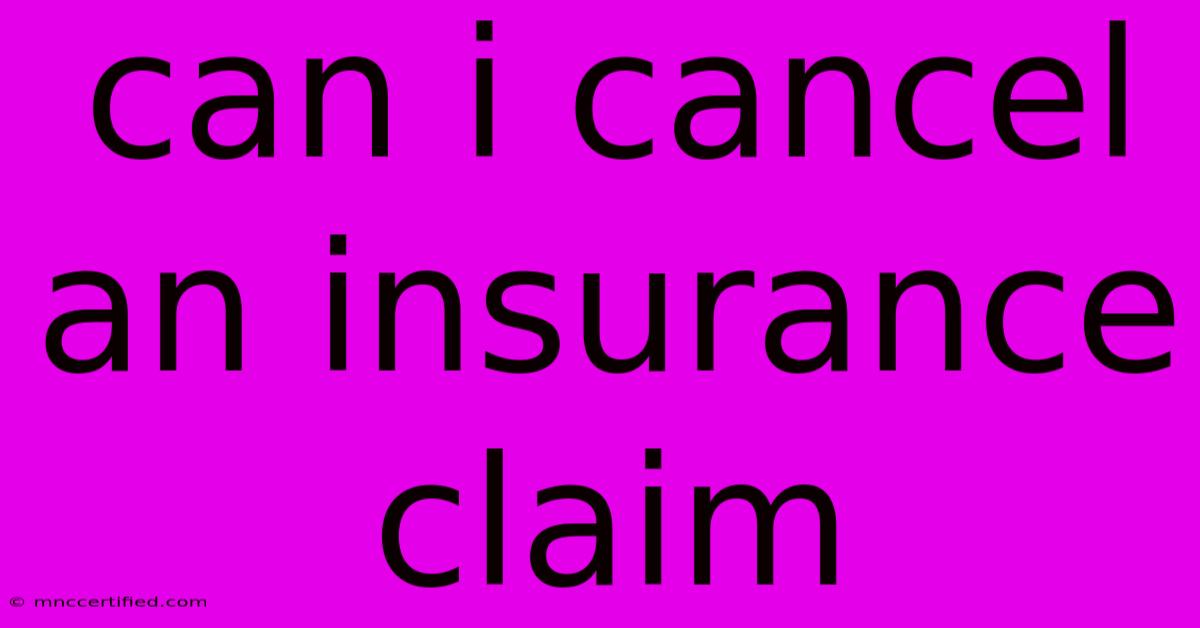Can I Cancel An Insurance Claim

Table of Contents
Can I Cancel an Insurance Claim? A Comprehensive Guide
Thinking about canceling an insurance claim? It's a decision that requires careful consideration, as the process and consequences can vary significantly depending on your situation and the type of insurance involved. This comprehensive guide will walk you through everything you need to know.
Understanding Your Right to Cancel
The ability to cancel an insurance claim depends heavily on the stage of the claims process and the specific terms of your policy. Generally, you have more leeway to withdraw a claim early on, before an adjuster has begun their investigation or before significant expenses have been incurred. However, once the insurer has started processing the claim, cancellation becomes significantly more complex.
Factors Affecting Cancellation
Several key factors determine whether you can cancel and the potential repercussions:
- Type of Insurance: Auto, home, health, and life insurance all have different cancellation policies. For instance, canceling a health insurance claim mid-treatment could have serious financial implications.
- Claim Stage: An initial notification of a claim is much easier to retract than a claim that's already been partially or fully settled.
- Policy Terms: Carefully review your policy documents. Specific clauses might address claim withdrawal procedures and potential penalties.
- Third-Party Involvement: If a third party is involved (e.g., a car accident), canceling might be more difficult, requiring the agreement of all involved parties and potentially legal counsel.
- Fraudulent Claims: Attempting to cancel a fraudulent claim will likely result in severe penalties, including policy termination and potential legal action.
How to Cancel an Insurance Claim
The process of canceling a claim is not standardized across all insurance providers. However, the general steps involve:
- Contact Your Insurer Immediately: Reach out to your insurance company as soon as possible. Explain your reasons for wanting to cancel the claim. The sooner you act, the better your chances of a smoother process.
- Provide a Written Request: Follow up your phone call with a formal written request to withdraw your claim. This provides a documented record of your action. Be clear and concise in explaining your reasons.
- Understand the Consequences: Be prepared to discuss the potential implications of canceling your claim. This might include a potential impact on future premiums or the need to repay any funds already received.
- Obtain Confirmation in Writing: Once the claim is canceled, request written confirmation from your insurance company. This document serves as crucial proof that the claim has been officially withdrawn.
Potential Consequences of Canceling a Claim
Before deciding to cancel, carefully weigh the potential consequences:
- Increased Premiums: Your insurer might raise your premiums in the future, reflecting an increased risk assessment.
- Impact on Future Claims: A canceled claim could influence how future claims are handled. The insurer might scrutinize subsequent claims more thoroughly.
- Financial Penalties: Depending on your policy and the stage of the claim, you might be required to repay any funds already received.
- Legal Ramifications: In some instances, canceling a claim might have legal consequences, particularly if third parties are involved or if fraud is suspected.
When Cancellation Might Be Necessary
While generally it's best to pursue a claim if you genuinely need the insurance coverage, there are specific situations where canceling might be the best course of action:
- Minor Damage or Loss: If the damage or loss is insignificant compared to your deductible, it might be more cost-effective to absorb the cost yourself.
- Misunderstanding of Coverage: If you initially filed the claim due to a misunderstanding of your policy's coverage, canceling and seeking clarification is advisable.
- Unforeseen Circumstances: Changes in your circumstances might render the claim unnecessary.
Conclusion: Proceed with Caution
Canceling an insurance claim is a significant decision with potential ramifications. Always thoroughly review your policy, understand the implications, and communicate clearly with your insurer before proceeding. If you're unsure about the best course of action, consult with an insurance professional or legal counsel. Remember, proactive communication is key to navigating this complex process successfully.

Thank you for visiting our website wich cover about Can I Cancel An Insurance Claim. We hope the information provided has been useful to you. Feel free to contact us if you have any questions or need further assistance. See you next time and dont miss to bookmark.
Featured Posts
-
Gatwick Terminal Reopens Bomb Scare Ends
Nov 23, 2024
-
Crosbys Home Targeted Masked Men Investigation
Nov 23, 2024
-
Bond Energy Chem Worksheet 16 2
Nov 23, 2024
-
Hanekoms Summit Green Future Begins
Nov 23, 2024
-
Tens Of Thousands Hit By Gatwick Evacuation
Nov 23, 2024